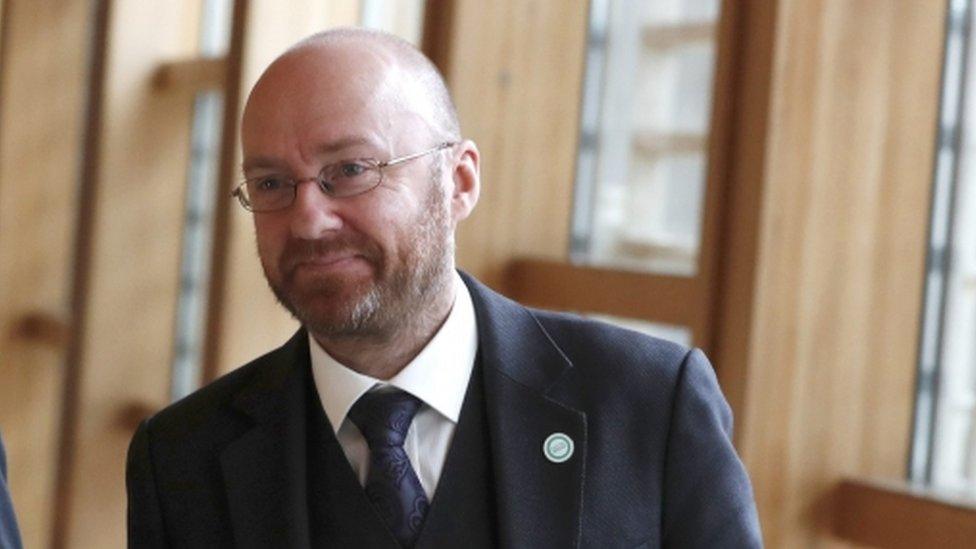General election 2017: Scottish Greens to field three candidates
- Published

The Scottish Greens are to focus on attempting to get Patrick Harvie elected to Westminster
The Scottish Greens have confirmed they are to stand only three candidates in next month's general election.
The party said it would be focusing on trying to get co-convener Patrick Harvie elected in Glasgow North.
It will also have candidates in Falkirk, and in the Edinburgh North and Leith seat.
The Greens had 32 candidates in the last election two years ago, but failed to win any seats. They currently have six seats at Holyrood.
The announcement means that the party will not qualify for a party political broadcast ahead of the election.
The Scottish Conservatives called on the Greens to also withdraw from televised debates ahead of the election, arguing that they "aren't a political party any more".
Senior SNP figures had called for the Greens not to stand in seats that have been targeted by the Conservatives, in order to avoid "splitting" the pro-independence vote.
But the Greens, who won 19 seats in last week's council election, insisted they would not be endorsing candidates from any other party in the election.

Analysis by Nick Eardley, BBC Scotland political correspondent
The Greens won six seats - more than the Lib Dems - at the last Holyrood election. So why are they standing in just three at this election?
A key reason is the first-past-the-post system. The party acknowledges it is highly unlikely it will win almost everywhere in Scotland - so is focusing its attention on areas where it thinks it stands some chance. For example Glasgow North, where it performed well in the equivalent Holyrood seat.
Another is financial. The party has just fought a local election and, in some areas, is thought to be skint. Parties have to stump up a £500 deposit in every seat and pay for campaigning costs.
But anti-independence parties smell a rat. They think the Greens are happy to stand aside to allow the pro-independence vote to go to the SNP.
The Greens deny that claim. The SNP too say there's no guarantee they'll automatically get the Green vote.
But in some seats, it could prove important. If everyone who backed the Greens in 2015 had voted SNP in Dumfriesshire, Clydesdale and Tweeddale, the nationalists would have won.

Yvonne McLellan, the party's elections and campaigns committee co-convener, said the Greens were "determined to reject the Tories' Hard Brexit disaster and fight for our future in Europe".
And she said the focus would be on electing Mr Harvie as the party's first MP, in a similar way as Greens in England focused efforts on electing Caroline Lucas as the MP for Brighton.
She added: "Our volunteers and campaigners have put huge effort and financial resources into the Holyrood and local elections, and this effort has paid off with new Greens elected to represent their communities.
"Theresa May knows she can rely on self-interested wealthy donors and campaigners who're allowed to break the spending rules without fear of prosecution. Greens don't work that way, and we're not in the pockets of the super-rich.
"That's why we are targeting our resources to build on our strong support in Glasgow North and in Edinburgh North and Leith, and also build support for the case against fracking in Falkirk."
'Sitting out'
Scottish Conservative candidate Ross Thomson said: "The Greens are pretty much admitting they aren't a political party any more.
"People will wonder what they're more afraid of, the electorate or their SNP masters.
"Considering they're sitting out this important election, I look forward to them withdrawing from the TV debates too."
Scottish Labour campaign manager James Kelly said: "The Greens have capitulated in this election in a desperate attempt to help their SNP masters.
"Patrick Harvie has sacrificed all his principles on the altar of Scottish independence.
"After his party helped inflict a £170m cut on local services across Scotland this year, it is no surprise he doesn't want to select candidates who would be told on the doorsteps how the Green/SNP cuts are hurting local communities."
Tommy Sheppard, the SNP incumbent candidate for Edinburgh East, had called on the Greens to avoid splitting the pro-independence vote in key constituencies.
He said: "They will want to stand some candidates as they are a national party and will want to put their case to their base, but in deciding which seats to contest and not to contest I think they should be mindful of not splitting the pro-Yes vote and certainly not splitting the anti-Tory vote.
Thursday will be the final day for candidates to register for the election, with nominations closing at 16:00.
The SNP, the Conservatives, Labour and the Liberal Democrats have each selected candidates in all 59 Scottish constituencies, while UKIP has said it is aiming to have more than 10.
For the first time, the Lib Dems have ensured there are female candidates in their top target seats.